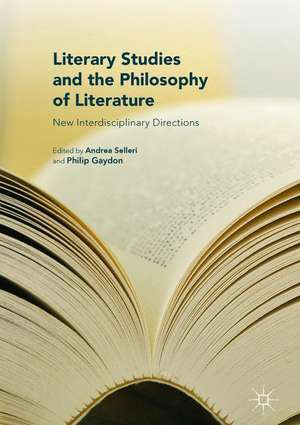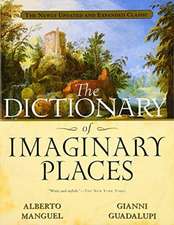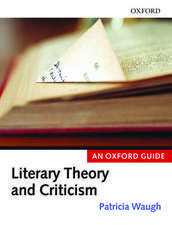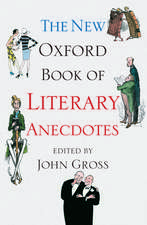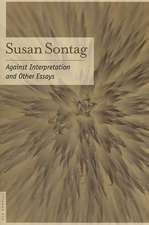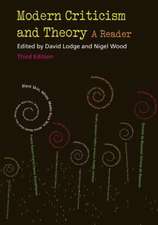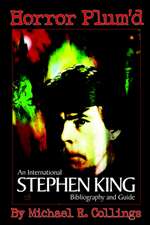Literary Studies and the Philosophy of Literature: New Interdisciplinary Directions
Editat de Andrea Selleri, Philip Gaydonen Limba Engleză Hardback – 15 dec 2016
It identifies that literary studies and the philosophy of literature address similar issues: What is literature? What is its value? Why do I care about characters? What is the role of the author in understanding a literary work? What is fiction as opposed to non-fiction? Yet, genuine, interdisciplinary interaction remains scarce. This collection seeks to overcome current obstacles and seek out new paths for exploration.
| Toate formatele și edițiile | Preț | Express |
|---|---|---|
| Paperback (1) | 638.57 lei 6-8 săpt. | |
| Springer International Publishing – 4 iul 2018 | 638.57 lei 6-8 săpt. | |
| Hardback (1) | 644.95 lei 6-8 săpt. | |
| Springer International Publishing – 15 dec 2016 | 644.95 lei 6-8 săpt. |
Preț: 644.95 lei
Preț vechi: 758.77 lei
-15% Nou
Puncte Express: 967
Preț estimativ în valută:
123.43€ • 128.38$ • 101.90£
123.43€ • 128.38$ • 101.90£
Carte tipărită la comandă
Livrare economică 12-26 aprilie
Preluare comenzi: 021 569.72.76
Specificații
ISBN-13: 9783319331461
ISBN-10: 3319331469
Pagini: 288
Ilustrații: XV, 290 p. 4 illus.
Dimensiuni: 148 x 210 x 23 mm
Greutate: 0.54 kg
Ediția:1st ed. 2016
Editura: Springer International Publishing
Colecția Palgrave Macmillan
Locul publicării:Cham, Switzerland
ISBN-10: 3319331469
Pagini: 288
Ilustrații: XV, 290 p. 4 illus.
Dimensiuni: 148 x 210 x 23 mm
Greutate: 0.54 kg
Ediția:1st ed. 2016
Editura: Springer International Publishing
Colecția Palgrave Macmillan
Locul publicării:Cham, Switzerland
Cuprins
Introduction.- PART I: INTERDISCIPLINARY ACTION IN THEORY.- 1. Criticism, Philosophy and the Differend; Catherine Belsey.- 2. The Discipline of Literary Studies; Stein H. Olsen.- 3. Analytic Philosophy of Literature: Problems and Prospects; Jukka Mikkonen.- PART II: INTERDISCIPLINARY INTERACTION IN PRACTICE.- 4. ‘I will draw a map of what you never see’: Cartographic Metaphor in Wittgenstein’s Philosophical Investigations; Mike Rose-Steel.- 5. The Pleasures of Solipsism for Writers and Philosophers; Ery Shin.- 6. To Tell What Happened as Invention: Literature and Philosophy on Learning From Fiction; Manuel García Carpintero.- PART III: USING THE PHILOSOPHY OF LITERATURE IN LITERARY STUDIES.- 7. Poetic Utterances: Attuning Poetry and Philosophy; Maximilian de Gaynesford.- 8. Reading as Fiction and Reading as Non-Fiction; Derek Matravers.- 9. The Opacity of Testimony; or, what the philosophy of literature cantell us about how to read Holocaust narratives; Samuel O’Donoghue.- PART IV: USING LITERARY STUDIES IN THE PHILOSOPHY OF LITERATURE.- 10. Literary Examples in Analytical Aesthetics: The Claim of the Particular; Andrea Selleri.- 11. What Do We Do With Words? Framing What is at Stake in Dealing with Literature; Marianna Ginocchietti and Giulia Zanfabro.- 12. Digital Literature and its Departure from the Supremacy of the Author Function; Heiko Zimmermann.- Bibliography.- Index.-
Notă biografică
Andrea Selleri is Associate Fellow at the University of Warwick, UK, where he completed a PhD in English and Comparative Literary Studies. His work on Victorian intellectual history has appeared in various journals and he is currently writing a monograph on the idea of the author in nineteenth-century literary criticism.
Philip Gaydon is a PhD candidate at the University of Warwick, UK. His research focuses on nineteenth-century children’s literature and virtue epistemology. He is currently creating a teaching and learning handbook for the university, teaches on imagination and ethical development, facilitates Philosophy in primary schools, and coaches women’s American Football at university and international level.
Textul de pe ultima copertă
This book is about the interaction between literary studies and the philosophy of literature. It features essays from internationally renowned and emerging philosophers and literary scholars, challenging readers to join them in taking seriously the notion of interdisciplinary study and forging forward in new and exciting directions of thought.
It identifies that literary studies and the philosophy of literature address similar issues: What is literature? What is its value? Why do I care about characters? What is the role of the author in understanding a literary work? What is fiction as opposed to non-fiction? Yet, genuine, interdisciplinary interaction remains scarce. This collection seeks to overcome current obstacles and seek out new paths for exploration.
Caracteristici
Forges a cutting-edge interdisciplinary interaction between literature and philosophy Dispenses with jargon, to encourage mutual comprehension Features contributors from the fields of both philosophy and literature
